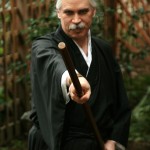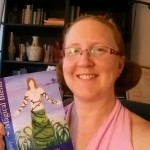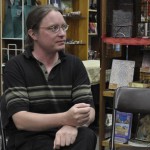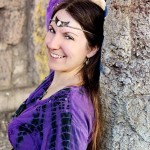For many pagans, books are the gateway to knowledge. They are our first teachers of magic and offer a new world of esoteric lore and knowledge. If you enter the home of just about any modern pagan you will no doubt find a bookshelf (or many bookshelves!) piled high with books written by English authors such as Gerald Gardner, Doreen Valiente or the Farrars. There will no doubt be more than a few by high profile American writers, names like Margot Adler, Isaac Bonewits and Scott Cunningham or maybe the more contemporary Orion Foxwood or Christopher Penczack. Both Britain and the United States both have successful and high profile publishers of pagan books, Minnesota based Llewellyn Worldwide LTD. being easily one of the most prominent. But north of the border, up in Canada, a growing number of writers are finding their way into print and injecting a Canadian influence into the pagan publishing world. But does being from Canada influence pagan writing?
Kerr Cuhulain, Grand Master and founder of a Wiccan order of Knighthood called the Order of Paladins and author of several books including “Pagan Religions, a Diversity Training Guide “and “Full Contact Magick” had this to say about being Canadian:

Kerr Cuhulain
“I think that it’s given me the opportunity to stand outside of the US and UK Pagan communities and observe what they do. I’ve always been more interested in doing what works than doing what is traditional.”
Lady Sable Aradia, author of the newly published “The Witches Eight Paths to Power: A Complete Course in Magick & Witchcraft adds:
“I’m very proudly Canadian. We are products of our culture and environment, and I think that our particular style of understatement and ability to laugh at ourselves is one of my strengths as a writer. Being Canadian also puts me outside of a lot of the politics of North American Paganism, which allows me the luxury to comment on them from the position of an observer in many ways.”
But are Canadians really different from our American neighbours? Aside from spelling some words differently (yes, we spell it neighbours.) and pronouncing the last letter of the alphabet as zed, not zee, Canadians are culturally different as well.
Brendan Myers, a prolific pagan Canadian writer, with more books under his belt than many people read in a year, had this to say about cultural differences between Canada and the US:
Dr. Brendan Myers
“… Canada is really a fringe country. We may be a rich, developed, industrialized nation, with the world’s second-biggest playground, but we’re not very populous, nor especially influential in world affairs. Standing in the shadow of our larger neighbour to the south, we are easily overlooked, or assumed to be culturally the same as that larger neighbour. Our history is not that of a conquering empire-builder, except perhaps by proxy of two of our founding nations, England and France. What is more, Canada arguably has no national mythology. One can easily point to other countries with big stories like “The American Dream”, or “The French Revolution”; these stories might be objectionable, they might have dark sides, and they may even be illusions, but they are definitely glamorous. We Canadians have no equivalent. A transcontinental railroad, a national public health care service, “peace, order, and good government”, and other “Canadian dreams” we’ve had over the centuries, don’t really deliver the same glamour. Ours is a wholesome but boring national brand. (Mind you, that might be okay.)
In that respect, as a Canadian writer, I find myself pulled in two directions. In one way, I want to write something that shows I come from a truly independent and unique nation, a distinct society (know what I mean?), and that we’re not just Americans with funny woolen hats. But in the other way, I want to write something that non-Canadians might still find interesting, and I worry that painting my stuff in red Maple leaves will turn people off.”
One of the biggest challenges for Canadian writers trying to get published is the lack of a big name publisher of pagan books in our own country. So how do these books make it to bookstore shelves? Response to this was varied between these three authors and all answers revolve around our close proximity of our neighbours to the south. Carving out our own distinct Canadian paganism is a tough one when so much of our culture, both pagan and mainstream, is overshadowed by the United States. So, is it hard to get published?
Sable:
“I would have to say not in my experience, actually. At least, not as long as you’re willing to deal with American publishers. The truth is that with such a big market just south of us, it’s very difficult for an independent Canadian arts scene to develop, and I would say that the Pagan market is more difficult still since it’s so small.”
Brendan:
“There are very few Canadian publishers who will carry a book about paganism in their catalogue. All the publishers I’ve ever worked with have been based in England or the USA. Publishers outside Canada often assume that no one outside of Canada will be interested in a Canadian perspective. I may be wrong about this, but it seems to me that writers in countries with larger populations, richer economies, and empires in their history, don’t need to worry about that. They benefit from a macro-economic and geo-political privilege, and a glamorous national mythology, which allows them to reach an international audience with a lot less effort.”
Kerr:
“I do not find it to be a problem at all. I’ve a large audience in the US, so it is pretty easy to find publishers for my works.”
As a former police officer/dispatcher and former Preceptor General of Officers of Avalon, an organization representing Neo-Pagan professionals in the emergency services (police, firefighters, emergency medical technicians), Kerr’s books reflect a Warrior spirit so often perceived from the outside of United States paganism through the work of groups like Circle Sanctuary’s Lady Liberty League or Order of the Pentacle.
Brendan’s books come from his academic background. Dr. Brendan Meyers earned his Ph.D in philosophy at the National University of Ireland, and now serves as professor of philosophy at Heritage College, in Gatineau, Quebec. His philosophy background informs his pagan writing. This theme of academia is also reflected by other Canadian writer/academics such as Shelley Rabinovich Ph.D (The Encyclopedia of Modern Witchcraft and Neo-Paganism (with James Lewis, and ‘An Ye Harm None’: Magical Ethics and Modern Morality (with Meredith Macdonald), and Sian Reid Ph.D (Between the Worlds: Readings in Contemporary Paganism)
What resources exist to promote sales and expose writers to new readers? Canada is a huge country; 9,984,670 square kilometers (3,855,101 square miles) stretching from the Pacific Ocean in the west to the Atlantic Ocean in the east, yet the population is just over 35 million, less than the state of California. Our pagan population is thinly and widely scattered. In this dispersion is a sense of camaraderie and support that is essential for our combined success:
Brendan:
“I get excellent support from the Canadian public, and I’m very grateful for it. I’ve attended pagan events to promote my work in seven out of ten provinces now. The administration of the college where I work has supported my publishing efforts: even the Director General, my most senior manager, read Loneliness and Revelation.”
Kerr:
“Most of the members of my Order of Paladins are Canadian. I just got back from teaching at PanFest in Edmonton. The support is there, I’m happy to say.”
Sable:
Sable Aradia
“Well, my local community has certainly been supportive! And the shop owners I’ve contacted through Western Canada have generally welcomed me with open arms. There’s a strong East/West divide so I don’t think many people have heard of me on the other side of the country yet, but I think there’s a general “us Canucks gotta stick together” sentiment, and I know that the friends I made at the Canadian National Pagan Conference in Montreal in 2010 have been making a great effort to spread the word. So, I would have to say that I feel very supported!”
Taking advantage of this support, Sable Aradia is about to embark on a book tour of western Canada. The tour will span four provinces, no small feat as it can take six to twelve hours to get from one city to another. Packed in her van will also be musical equipment as Sable is an accomplished singer and musician. She will also be doing house concerts to help supplement her travels. Her adventures started off close to home so far and she had this to say about how it is going:
“It’s off to a good start! I started in my hometown of Vernon, BC for the book launch and I sold out. The following weekend I went to Nelson, Castlegar, Enderby and Kelowna for World Goddess Day. This weekend I was at a Kelowna bookstore and a metaphysical store in Penticton (all towns in the province of British Columbia). Then at the end of the month I’m heading eastward.”

T. Scarlet Jory
For books with very distinct regional flare, T.Scarlet Jory has released “Magical Blend: Book of Secrets (BOS)” and “Magical Blend: Book of Spells & Rituals (BOS) (Volume 2)”. These books celebrate landmark Le Melange Magique/The Magical Blend, a pagan shop in Montreal Quebec. This shop, which sadly has closed its doors, served customers in both of Canada’s official languages, English and French. It was known for its selection of in-house made teas, bath salts, incense and more.
Scarlet reminisces: “When the store’s physical location closed and the reference books of shadows developed by all the staff suddenly were no longer available to the public, I felt it was important to compile them and print them. That way everyone can access them again. The knowledge is a collection of gems from dozens of experienced staff members who helped the community.”
One curious book, written in 1989 by Kevin Marron, a reporter from The Globe and Mail, a national newspaper, “Witches, Pagans & Magic in the New Age” was the story of the people he met while investigating allegations of Satanic ritual abuse (remember the Satanic Panic folks? It happened in Canada as well!). While not a pagan himself, Marron provides a rare and sympathetic peek at the Canadian Pagan scene in the late 1980’s.
Many other voices have contributed to recording the story of Canadian Paganism. Some of the books may be harder to find, and unlikely to show up in foreign book or occult shops, but have value and interest to Pagans everywhere. The rise of e-readers and online shopping may put a Canadian book in your own collection soon.
The Wild Hunt is not responsible for links to external content.
To join a conversation on this post:
Visit our The Wild Hunt subreddit! Point your favorite browser to https://www.reddit.com/r/The_Wild_Hunt_News/, then click “JOIN”. Make sure to click the bell, too, to be notified of new articles posted to our subreddit.


Very interesting! Thank you for this.
One of the highest compliments I was ever paid in Ireland was being mistaken for a Canadian, not only because my WA accent is pretty close to a B.C. accent (and you can see Vancouver Island from my house, literally!), but because I was “nice” and “intelligent,” which says just as much good for Canadians on the wider world scene as it says bad for Americans! 😉
I don’t get up to B.C. much, but I’ve never done any investigating of Pagan activities up there when I have gone…it might be interesting to look into it sometime, though. Thanks for this, Dodie!
I enjoyed reading this, as a Canadian Pagan, and would like to point people in the direction of Ehoah, a built-from-scratch tradition by an amazing Canadian named Rua Lupa.
I honestly blushed a little at reading this. Thank you for the complimentary recommendation GimliGirl ^_^
Perhaps it’s because I’m “a Canadian once-removed”, as Canadian singer/songwriter Connie Kaldor called me when she still had only one record out, but I’ve been aware of Canadian culture (and I don’t mean just poutine and Nanaimo bars) most of my adult life. My paternal grandfather, dead before my parents met, was Québécois. She and Stan Rogers were my introductions to Canadian music.
I’ve been on lists with Canadian pagans, but the latest was about a decade ago. I’m glad to read more of pagans, and paganism, in Canada, especially since their First Peoples gave them different mythologies and perspectives on life than US Natives have given us. It is very sad, that in each country, whites treated their Native populations just as badly as did their neighbors across the border.
Loved the article, I’ll be happy to read more from you.
I personally recommend The Sacred Balance by David Suzuki (a Canadian author, scientist, and activist)
I wish Brendan Myer’s vision of Canadian history as a non-empire builder was the whole story, but when we look at Canada’s relationship with first nations peoples, another, less benign, view of Canada’s history comes into focus. Maybe if there was some context to the following quote it would clarify his take on Canadian history: “Our history is not that of a conquering empire-builder, except perhaps by proxy of two of our founding nations, England and France”. As far as I know, we have not actively gone outside of our borders to colonize as a sole invading force, which is probably what Brendan Myers meant. Although it is probable that we have sent troops on joint missions that could be seen as colonizing actions. However, within our borders, Canada was an empire-builder. The Canadian government, Canadian religious institutions and Canadian industry took land from the first nations (especially in BC) and committed abuses at residential schools across Canada. Here are two sources that provide a more detailed account of Canada’s role as empire builder on the land of the first peoples and the atrocities committed against first peoples. This series of documentaries provides an overview of Canada’s troubling actions towards aboriginal peoples and the complex relationship between settler cultures and aboriginal peoples: http://www.cbc.ca/8thfire//2011/11/indigenious-in-the-city.html. This second, deeply troubling, link details the atrocities committed at just one of the many residential schools in Canada: http://knlive.ctvnews.ca/ottawa-forced-to-turn-over-reports-of-electric-chair-use-at-residential-school-1.1641479.